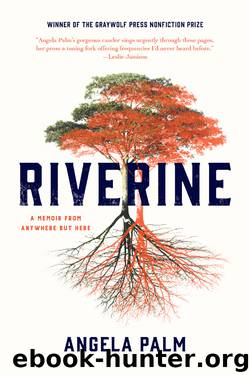Riverine by Angela Palm

Author:Angela Palm
Language: eng
Format: epub
ISBN: 978-1-55597-942-3
Publisher: Graywolf Press
Published: 2016-08-18T16:00:00+00:00
Self-Fulfilling Prophecy
The shoe barn sat in a thick patch of pine trees between the old funeral parlor and a crumbling row of apartment homes in my hometown. I’d go there even after I left. The appearance of the surrounding buildings reflected the way this part of town was built: on dreams half-launched between bankruptcies, destined for swift abandonment, eventual and total disrepair. After removing the faded No Trespassing sign that hung askew from the rusted, unlocked chain, I’d crack the sliding hinge door open wide to reveal the heaps of boxes. The boxes of shoes stored in the barn that once formed well-organized towers—someone’s bounty of hope—were now dashed across the floor, as if toppled by a child’s whim. The dream of a family’s business abandoned. Or so I believed. All I knew for sure was that the family was gone and the shoes remained, decades out of fashion and rotting. Slim pairs of weathered go-go boots made of crushed velvet and black-and-white saddle shoes with platform heels covered the barn floor. A range of mismatched sizes and varieties formed piles at the base of the heaps like skeletons ejected from their coffins.
When applied to criminal theory, the self-fulfilling prophecy, a concept developed by sociologist Robert K. Merton, asserted that deviants became such after being told that’s what they were: bad. It was the manifestation of belief or prediction that involved labeling a young person a criminal, or a future criminal.
I began stealing shoes from the barn in high school. Sometimes I would take friends there and invite them to help themselves, as if the place were mine to give away. In college, when I learned the nuances between the various crimes involving theft, I was able to retroactively categorize my actions as burglary, defined as petty larceny plus breaking and entering. Trespass with the intent to steal. But did I consider myself a criminal, either then or now? No. Again, I thought of Corey, who, before the serious crime he committed, had committed crimes similar to mine but, unlike me, had been told he was a criminal and treated as such. He’d been labeled bad from the first incident of deviance, which had not hurt anyone and had not been intended to hurt anyone. Somehow, I was still good.
Download
This site does not store any files on its server. We only index and link to content provided by other sites. Please contact the content providers to delete copyright contents if any and email us, we'll remove relevant links or contents immediately.
| Mid Atlantic | Midwest |
| New England | South |
| West | Kindle Edition |
| Large Print | Audible Audiobook |
| Audio CD | Board Book |
Kitchen confidential by Anthony Bourdain(3093)
I Know Why the Caged Bird Sings by Maya Angelou(2148)
Dry by Augusten Burroughs(2102)
Kitchen Confidential by Anthony Bourdain(1914)
A Child Called It by Dave Pelzer(1878)
I know why the caged bird sings by Maya Angelou(1866)
KITCHEN CONFIDENTIAL Adventures in the Culinary Underbelly by Anthony Bourdain(1803)
A Heartbreaking Work of Staggering Genius by Dave Eggers(1794)
all by Unknown Author(1682)
Zeitoun by Dave Eggers(1656)
Vogue on Yves Saint Laurent by Natasha Fraser-Cavassoni(1615)
Taken by J. C. Owens(1562)
Extraordinary, Ordinary People by Condoleezza Rice(1504)
A Stolen Life by Dugard Jaycee(1502)
The Farm in the Green Mountains by Alice Herdan-Zuckmayer(1456)
Law Man by Shon Hopwood(1445)
House of Darkness House of Light by Andrea Perron(1410)
The Year of Yes by Maria Headley(1374)
The Big Sea by Langston Hughes(1350)
